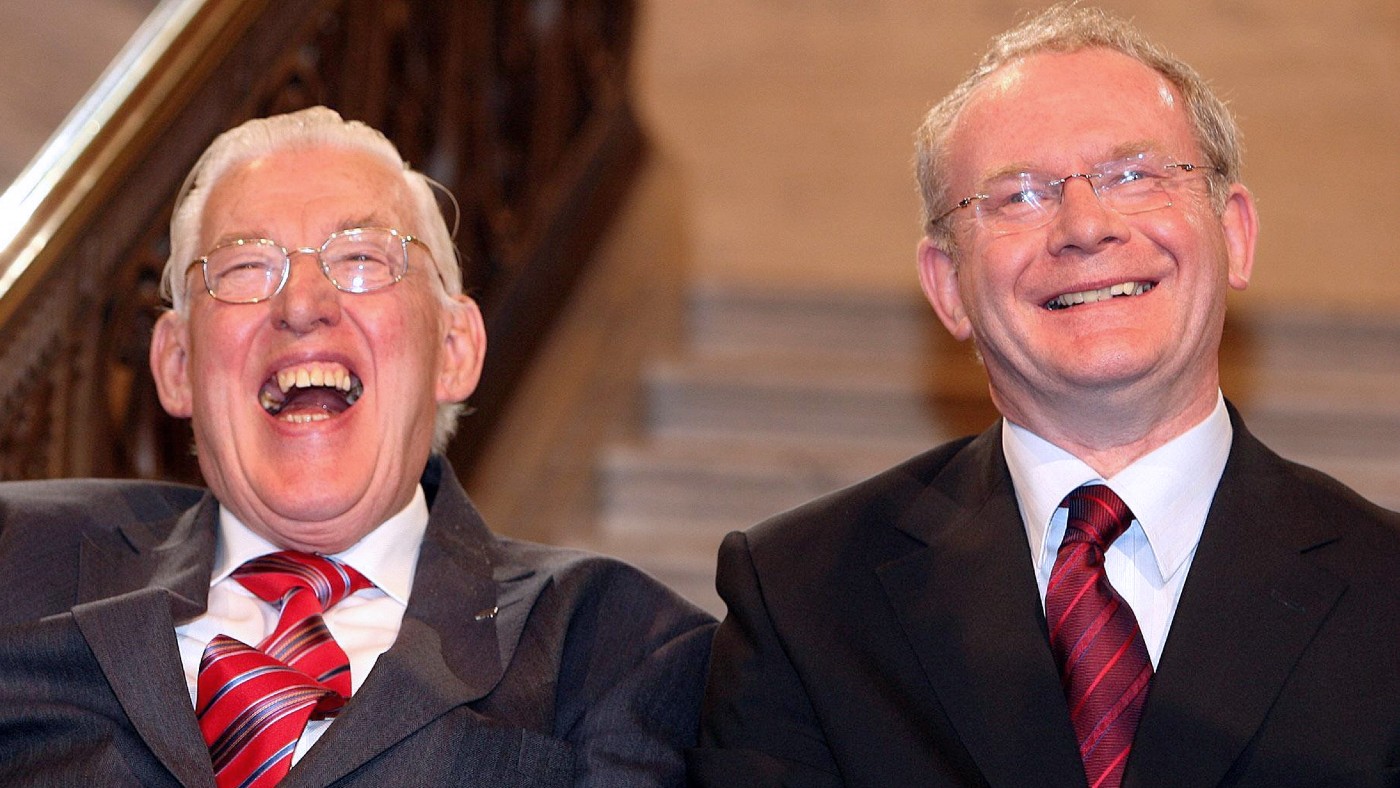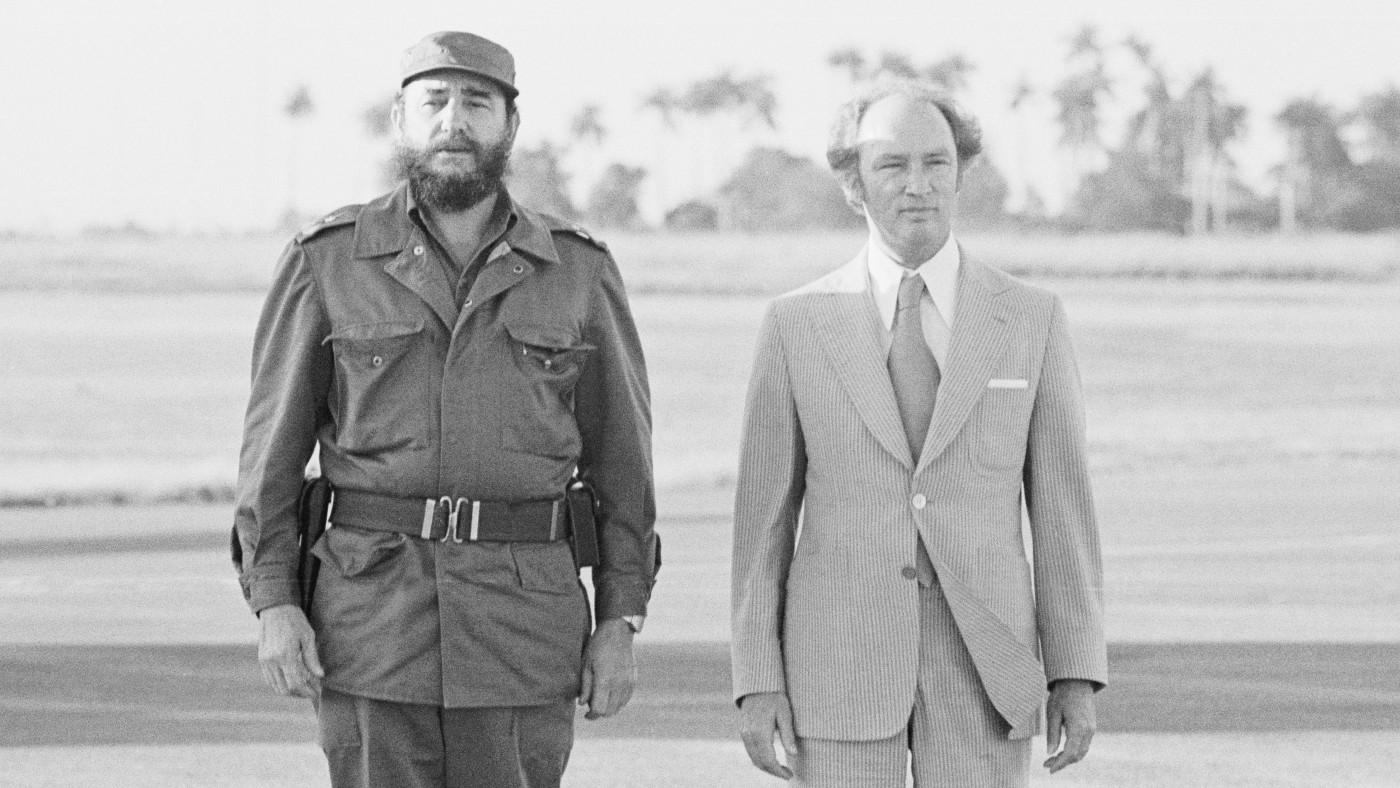Unlikely political friendships through the years
Cross-party friendships are a common, but rarely publicised, phenomenon

A free daily email with the biggest news stories of the day – and the best features from TheWeek.com
You are now subscribed
Your newsletter sign-up was successful
A former Conservative minister threw her support behind Labour leader Keir Starmer this week after quitting her own party and branding it ridden with “ideology and self-obsession”.
Claire Perry O’Neill, who was a Tory MP from 2010 to 2019 and served as a member of Theresa May’s cabinet as well as briefly under Boris Johnson, said in an article for The Times that she had quit the Conservative Party earlier this month, before lavishing praise on the Labour leader.
In an article on the growth of renewable energy, she said Prime Minister Rishi Sunak and his chancellor Jeremy Hunt are “too beholden to a party dominated now by ideology and self-obsession to deliver the big changes we need in a fact-based, competent way”. By contrast, she praised Starmer for his “sober, fact-driven, competent political leadership”.
The Week
Escape your echo chamber. Get the facts behind the news, plus analysis from multiple perspectives.

Sign up for The Week's Free Newsletters
From our morning news briefing to a weekly Good News Newsletter, get the best of The Week delivered directly to your inbox.
From our morning news briefing to a weekly Good News Newsletter, get the best of The Week delivered directly to your inbox.
Switching political allegiances is rare but not unheard of in the world of Westminster politics – last January, Christian Wakeford, who won Bury South from Labour for the Conservatives at the 2019 election, crossed the floor to join Labour and is now a Labour whip. Labour List reported that a catalyst behind the switch had been Wakeford’s friendship with Labour MP Barry Gardiner, following their work together in support of Gardiner’s anti “fire and rehire” bill.
Friendships across the political divide are “always surprising to outside observers” within the walls of Westminster but “they are so common that they are rarely commented upon”, wrote former Labour MP Tom Harris in The Telegraph. Nevertheless, such friendships are frequently a “love that dare not speak its name” in the public eye, he said.
Here’s a look at some of the more surprising political friendships within Westminster and across the world.
Alastair Campbell and Charles Kennedy
Former New Labour spin doctor and journalist Alastair Campell wrote movingly about his close friendship with the late Liberal Democrat leader Charles Kennedy in an article for the i news site in 2021.
A free daily email with the biggest news stories of the day – and the best features from TheWeek.com
Becoming close during the New Labour years – despite significant disagreement on the Iraq War – Campbell wrote that he was “taken aback by just how deeply grief-stricken” he was when the Lib Dem politician died in 2015. He paid tribute to a friendship that “taught me it is possible to be on different sides in politics, but the same side when it comes to basic humanity”.
Ian Paisley and Martin McGuinness

Long-standing and often bitter political rivals in Northern Irish politics, Sinn Fein’s Martin McGuinness and the DUP’s Ian Paisley formed an unlikely political friendship after the two parties came to a power-sharing agreement in 2007.
After Paisley and McGuinness became First Minister and Deputy First Minister, the pair would frequently travel together, albeit discreetly, sharing the same aircraft but disembarking separately to avoid being seen together. Their close bond quickly became evident, however, earning them the nickname “The Chuckle Brothers”.
“Our relationship confounded many. Of course, our political differences continued; his allegiance was to Britain and mine to Ireland. But we were able to work effectively together in the interests of all our people,” said McGuinness after Paisley’s death, according to the Belfast Telegraph.
Margaret Thatcher and Augusto Pinochet
The friendship between Prime Minister Margaret Thatcher and Chilean dictator Augusto Pinochet was “widely criticised” at the time, said MSN.com. The unlikely alliance began in 1982 when Chile assisted Britain in regaining the Falkland Islands, which had been invaded by Argentina.
Thatcher, who never forgot the debt of gratitude, later, spoke out against the “callous and unjust” decision to place her “true friend” under house arrest in England for human rights violations in 1998.
Joe Biden and John McCain

The late Republican senator John McCain shared a close friendship with President Joe Biden while they served together in the US Senate. Their close friendship over party lines was evident at McCain’s funeral where Biden paid a loving tribute to the late politician, stating: “I’m a Democrat. And I loved John McCain.”
Their friendship “seems to have affected policymaking” too, said CNN. Biden and McCain were seen to be in an “emotional discussion” before McCain cast a critical vote against the repeal of the Affordable Care Act in 2017, one of three Republicans to do so.
Bill Clinton and George Bush Snr
“If anyone had a right to despise Bill Clinton,” it was “the man he kicked out of the White House”, wrote Jacob Hess for Deseret News.
Instead, the two formed an unlikely friendship sparked by a generous note left by George Bush Snr to his successor on entering the White House. It read: “You will be our president when you read this note. I wish you well. I wish your family well. Your success now is our country’s success. I am rooting hard for you. Good luck, George.”
Clinton would later call their friendship “one of the great joys of my life” and upon the death of the former Republican president said: “I just loved him.”
Bill Clinton and George Bush Snr

The friendship between Canada’s former Prime Minister Pierre Trudeau and Cuban revolutionary Fidel Castro was one that was “marred” by the Western world’s isolationist policies towards communist Cuba, said MSN.com.
In 1976, Trudeau visited Havana with the aim of normalising relations with the island nation, despite the meeting drawing criticism from members of the Canadian public. Diplomatic ties between the two countries were never severed, with Castro attending Trudeau’s funeral in 2000.
Upon Castro’s death in 2016, Canadian PM Justin Trudeau warmly recalled his late father’s friendship with the Cuban leader and paid tribute to a “remarkable leader” in words that Reuters called “markedly more positive” than those of most Western leaders who “either condemned the revolutionary leader’s human rights record or tiptoed around the subject”.
Sorcha Bradley is a writer at The Week and a regular on “The Week Unwrapped” podcast. She worked at The Week magazine for a year and a half before taking up her current role with the digital team, where she mostly covers UK current affairs and politics. Before joining The Week, Sorcha worked at slow-news start-up Tortoise Media. She has also written for Sky News, The Sunday Times, the London Evening Standard and Grazia magazine, among other publications. She has a master’s in newspaper journalism from City, University of London, where she specialised in political journalism.
-
 Moltbook: The AI-only social network
Moltbook: The AI-only social networkFeature Bots interact on Moltbook like humans use Reddit
-
 Judge orders Washington slavery exhibit restored
Judge orders Washington slavery exhibit restoredSpeed Read The Trump administration took down displays about slavery at the President’s House Site in Philadelphia
-
 Kurt Olsen: Trump’s ‘Stop the Steal’ lawyer playing a major White House role
Kurt Olsen: Trump’s ‘Stop the Steal’ lawyer playing a major White House roleIn the Spotlight Olsen reportedly has access to significant U.S. intelligence
-
 How corrupt is the UK?
How corrupt is the UK?The Explainer Decline in standards ‘risks becoming a defining feature of our political culture’ as Britain falls to lowest ever score on global index
-
 The Mandelson files: Labour Svengali’s parting gift to Starmer
The Mandelson files: Labour Svengali’s parting gift to StarmerThe Explainer Texts and emails about Mandelson’s appointment as US ambassador could fuel biggest political scandal ‘for a generation’
-
 Will Peter Mandelson and Andrew testify to US Congress?
Will Peter Mandelson and Andrew testify to US Congress?Today's Big Question Could political pressure overcome legal obstacles and force either man to give evidence over their relationship with Jeffrey Epstein?
-
 Reforming the House of Lords
Reforming the House of LordsThe Explainer Keir Starmer’s government regards reform of the House of Lords as ‘long overdue and essential’
-
 How long can Keir Starmer last as Labour leader?
How long can Keir Starmer last as Labour leader?Today's Big Question Pathway to a coup ‘still unclear’ even as potential challengers begin manoeuvring into position
-
 What is at stake for Starmer in China?
What is at stake for Starmer in China?Today’s Big Question The British PM will have to ‘play it tough’ to achieve ‘substantive’ outcomes, while China looks to draw Britain away from US influence
-
 Can Starmer continue to walk the Trump tightrope?
Can Starmer continue to walk the Trump tightrope?Today's Big Question PM condemns US tariff threat but is less confrontational than some European allies
-
 Three consequences from the Jenrick defection
Three consequences from the Jenrick defectionThe Explainer Both Kemi Badenoch and Nigel Farage may claim victory, but Jenrick’s move has ‘all-but ended the chances of any deal to unite the British right’